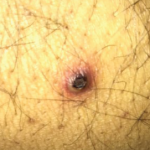NEW YORK (Reuters Health)—Patients with inflammatory bowel disease (IBD) commonly develop skin lesions related to anti-tumor necrosis factor (anti-TNF) medications, according to a retrospective study.
“We were most surprised by the relatively high percentage (30%) of patients developing skin problems while being treated with anti-TNF agents,” Dr. Isabelle Cleynen from KU Leuven, Belgium, tells Reuters Health by email. “Not all skin problems were equally severe, though, and most patients had a good response to treatment of their skin problem.”
Psoriasiform skin manifestations have been reported as adverse events associated with anti-TNF therapy, but other skin lesions associated with these treatments have not been well characterized.
Dr. Cleynen and colleagues describe skin lesions that developed in association with anti-TNF treatment in a retrospective study of 917 patients with IBD.
Overall, 264 patients (29%) developed skin lesions a median 11.6 years after diagnosis of IBD and 1.9 years after initiation of anti-TNF treatment. More women (31%) than men (26%) developed skin lesions.
The risk of developing skin lesions was 31% among patients carrying one to four risk variants for the subset of single-nucleotide polymorphisms showing at least nominally significant association with lesion development and 48% for those carrying more than four such risk variants.
Infliximab doses and trough levels were similar in patients with and without skin lesions, and development of lesions did not seem to be associated with an apparent reduction in infliximab effectiveness.
The most common lesion types were psoriasiform eczema (81 patients, 30.6% of those with lesions), eczema (62 patients, 23.5%), xerosis cutis (28 patients, 10.6%), palmoplantar pustulosis (14 patients, 5.3%) and psoriasis (10 patients, 3.8%), all of which are illustrated in the report, online Dec. 8 in Annals of Internal Medicine.
The extremities, face and trunk were most commonly affected. In contrast, the scalp and pubic regions were more often affected by skin lesions not related to anti-TNF therapy.
Most patients responded to dermatological treatment, although 10.6% of those with skin lesions discontinued anti-TNF treatment because of the lesions.
“The best advice our dermatologists and gastroenterologists give to our patients is general preventive measures for dry skin (avoidance of a bath, no soaps but oils, hydrating creams, etc.), which in many cases seemed to be effective to resolve the skin problem,” Dr. Cleynen says.
“Of course, with our study set up, we cannot say how many patients would not have developed a skin problem, or would not have progressed from a dry skin to a more severe type of skin lesion when having taken preventive measures. But we are convinced that these preventive measures are important, and that they will help at least in a subset of patients,” she adds.
“We recommend close surveillance by the treating physician, explaining above all preventive measures for dry skin, before treatment is commenced and early referral to a dedicated dermatologist,” Dr. Cleynen concludes. “In our experience, this meant resolution of the skin problems in many patients, and only a low number of patients needing to stop anti-TNF treatment because of the skin problem.”
She adds, “An additional important note for the physicians is the appearance of alopecia areata/universalis with this class of drugs in a few patients, which can be severe and irreversible.”
The study was partly funded by Janssen Biologics. Dr. Cleynen and some of her co-authors report financial ties to the company.

